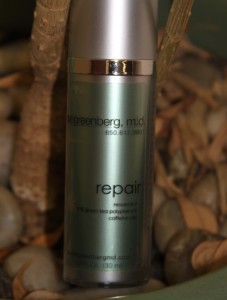Retin A products are just good for your skin. I can’t tolerate RetinA- I get too blotchy, red, and flaky, so I stop using it. (Shocking, but skin products are truly not effective if locked away in your cabinet.) But I know how good they are for your skin. So I worked with a company to make a retinol product. Retinol is not Retin A. But it has benefits. This is a collagen builder, which assists in the achievement of smoother, firmer and more evenly toned skin.
Retinol.
Green Tea.
Caffeine.
Hyaluronic acid
This Retinol based formulation helps achieve more radiant looking skin while delivering the skin enhancing benefits of Green Tea Polyphenols and caffeine in a moisturizing base.
- Anti-aging patients and those concerned about photodamage.
- Acne Patients – the increased exfoliation unclogs pores and helps fade acne scars
Some science articles:
Int J Cosmet Sci. 2011 Feb;33(1):62-9
Dermal elastic fibres are extracellular matrix protein complexes produced by fibroblasts and involved in skin elasticity. Elastin fibres decrease with age as a result of reduced synthesis and increased degradation, resulting in skin sagging and reduced skin elasticity. In this study, we show that retinol (ROL), known to enhance dermal collagen production, is also enhancing elastin fibre formation. ROL induced elastin gene expression and elastin fibre formation in cultured human dermal fibroblasts. Topical treatment of cultured human skin explants with a low dose (0.04%) of ROL increased mRNA and protein levels of tropoelastin and of fibrillin-1, an elastin accessory protein, as documented by QPCR and immunohistochemistry staining. Luna staining confirmed the increased elastin fibre network in the ROL-treated skin explants, as compared with untreated controls. These data demonstrate that ROL exerts its anti-ageing benefits not only via enhanced epidermal proliferation and increased collagen production, but also through an increase in elastin production and assembly.

